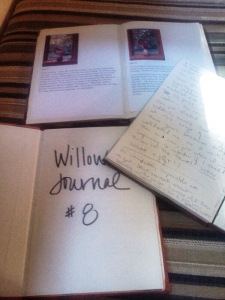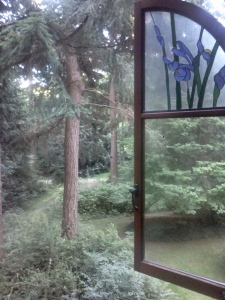To Do List for the Damaged:
My Hedgebrook recipe for writing a book
By Tammy Robacker
As Hedgebrook opens their call for women writers to apply this June, I cannot help but express gratitude for my own poetry residency there in 2011.
My experience at Hedgebrook is especially humbling today since I celebrate recent news that Villain Songs, a poetry manuscript I began drafting in that residency, will be published in 2016 with ELJ Publications. Villain Songs is a collection of poems I wrote that are informed by my personal experience surviving a life-altering trauma as a child.
When I applied to Hedgebrook in 2010, my application was a compelling, emotionally-charged proposal describing my intent to write a poetry book about my experience with childhood sexual abuse. Additionally, I submitted a folder full of very private poetic purges rather than finished, well-crafted pieces ready for journal publication. I just wasn’t sure how I could focus to do such taboo work without their help.
I needed to go deeply into the dark cave of my memory and sit there writing about the monsters, goblins and grief I found inside.
At the time, I worked as a communications manager for a Washington State non-profit, and my day was full of writing dry publicity and announcements; scheduling political events; and managing board member travel and legislative affairs. Also, I served as Poet Laureate of Tacoma in 2010, so my evenings and weekends were full of volunteer teaching, workshop, and reading engagements. I didn’t have much time leftover to build up my personal portfolio of poems, not to mention I did not have a lot of the privacy and solitude. I needed to go deeply into the dark cave of my memory and sit there writing about the monsters, goblins and grief I found inside. I applied to Hedgebrook with great hope in my heart to get the support I needed to write this book.
On December 16, 2010—also the 6th anniversary of my Father’s death—I received a letter announcing that I had been chosen for a Writer in Residence award at Hedgebrook. Out of nearly 800 applicants, I was one of the final 38 selected for a stay. It was the greatest gift of time and quietude I needed to dive into this project. To have the Hedgebrook community back my literary concept empowered me with a tremendous feeling of courage and support. To be a survivor and have such a grand affirmation and valuation of your narrative is a great gift as many of us walk around unheard and disbelieved. Hedgebrook’s acceptance fueled my story forward. It sent my dream into action.
So how does one write a book at Hedgebrook?
I took time off work. I moved into a cottage. I lived in Willow Cottage for nearly 3 weeks—my small woodsy retreat with a bedroom loft and wood burning stove. I let down my guard to allow someone else to shelter and provide for me. I watched the sun come up. I drank free trade coffee. I napped after writing all morning long. I nibbled dark chocolate. I bathed in a huge, claw foot tub nearly each day of the week. I journaled in the cottage. I journaled in the grass. I took long walks. I picked fresh lavender and sunflowers. I read books from the on-site library full of Hedgebrook authors and poets. I ate white strawberries and tried fresh kale for the first time grown right there on the Hedgebrook Farm. I sat at the Farm Table every night and dined on healthy, nourishing meals prepared and served by a friendly chef. I met new people. I made lifelong friends— I found camaraderie and connection with a number of women writers from across the globe that, like me, arrived at residency with a dream to document.
And mostly, at Hedgebrook, I wrote my poetry. I wrote a new poem every day. I wrote about the bad. I wrote about the beautiful too. I wrote whatever sprouted and sprung up from the soil of my sad/mad brain. Many of those jottings and journalings became seedlings for more carefully sculpted pieces in later months.
If I did not have the time, the privacy, and the support that Hedgebrook awarded me to begin the poems of Villain Songs, I don’t think I could have embraced the project as deeply and fully as I did. To create art about something as pained and private as childhood sexual abuse was work that I believed I would have to do alone.
But the Hedgebrook community created a safe, welcoming environment for me to do the difficult while they absolved me of my own life’s constraints. I was sheltered, fed, and supported at no-cost to freely write about something even my own family will not let me speak about. It was the place I needed to be to give all those bad memories, strange fragments, and troubled images their own kind of freedom and credence to write them out of myself. For me, the gift of Hedgebrook was transformative. It helped me take something terrible and spin it into song.
For more information about Hedgebrook, including the Writers in Residence Program and upcoming readings and events, check out the website at: http://www.hedgebrook.org



